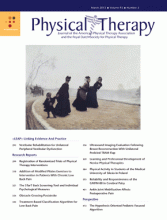Abstract
Background Clinical trial registration has several putative benefits: prevention of selective reporting, avoidance of duplication, encouragement of participation, and facilitation of reviews. Previous surveys suggest that most trials are registered. However, these surveys examined only trials in journals with high impact factors, which may bias the results.
Purpose This study examined the completeness of clinical trial registration and the extent of selective reporting of outcomes in a random sample of published randomized trials in physical therapy.
Data Sources This was a retrospective cohort study in which 200 randomized trials of physical therapy interventions were randomly selected from those published in 2009 and indexed in the Physiotherapy Evidence Database (PEDro), regardless of the publishing journal.
Data Extraction Evidence of registration was sought for each trial in the study, on clinical trial registers, and by contacting authors.
Data Synthesis The proportion of randomized trials that were registered was 67/200 (34%). This proportion was significantly lower than among the trials in journals with high impact factors, where the proportion was 75% (odds ratio=7.4, 95% confidence interval=2.6–21.4). Unambiguous primary outcomes (ie, method and time points of measurement clearly defined in the trial registry entry) were registered for 32 trials, and registration was adequate (ie, prospective with unambiguous primary outcomes) for 5/200 (2.5%) trials. Selective outcome reporting occurred in 23 (47%) of the 49 trials in which selective reporting was assessable.
Limitations The inclusion of only English-language trials prevents generalization of the results to non–English-language trials.
Conclusions Registration of randomized trials of physical therapy interventions is rarely adequate. Consequently, the putative benefits of registration are not being fully realized.
Footnotes
Dr Elkins, Dr Moseley, Dr Sherrington, Dr Herbert, Dr Maher, Dr P.H. Ferreira, and Dr M.L. Ferreira provided concept/idea/research design. Mr Pinto, Dr Elkins, Dr Moseley, Dr Sherrington, Dr Herbert, and Dr Maher provided writing. Mr Pinto, Dr Elkins, and Dr Moseley provided data collection. Mr Pinto, Dr Elkins, Dr Sherrington, Dr Maher, and Dr P.H. Ferreira provided data analysis. Dr Moseley, Dr Maher, Dr P.H. Ferreira, and Dr M.L. Ferreira provided consultation (including review of manuscript before submission).
This project was not directly supported by any external grants or funds. Mr Pinto is supported by the Capes Foundation, Ministry of Education of Brazil. Dr Maher is supported by a research fellowship funded by the Australian Research Council. Dr Sherrington and Dr Herbert are supported by research fellowships funded by the National Health and Medical Research Council, Australia. The Capes Foundation, the Australian Research Council, and the National Health and Medical Research Council had no role in the design and conduct of the study; collection, management, analysis, or interpretation of data; or preparation, review, or approval of the manuscript. Dr Moseley is a developer of the Physiotherapy Evidence Database (PEDro) and is currently employed to manage PEDro.
- Received May 21, 2012.
- Accepted October 31, 2012.












